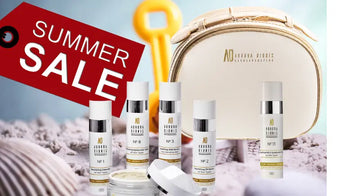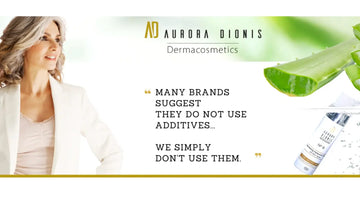Winter is coming to an end and spring break is just around the corner.
Sun protection during winter sports is just as important and indispensable as your skis or snowboard. In the mountains, the air is clean, clear, and deep blue, making UV rays much stronger even when the sun isn't shining. UV rays reach your skin even on cloudy days. The sun's reflection on the snow makes your skin burn even faster.
Do you know what to look for when buying sunscreen?
At the beach, sunlight is bright, and the water also reflects UV rays. If your skin is exposed to UV rays for too long, they can cause skin aging and DNA damage. Good protection against both UVA and UVB rays is therefore essential. However, choosing the right product remains challenging.
Sun filters
My clients have regularly asked me if I'm going to develop products with sunscreens. After delving into the scientific literature, I've decided not to (yet). At Aurora Dionis Dermacosmetics, skin-friendliness and environmental friendliness are paramount. In my experience, these aren't fully guaranteed with the existing sunscreen options.
Types of filters
At first glance, the names of the different types of sunscreens are rather confusing. A chemical filter is also called organic because it contains carbon compounds. Organic doesn't refer to biological or natural, but to the branch of chemistry that deals with organic compounds.
Chemical filters
Chemical filters absorb ultraviolet rays. Examples include benzophenone, avobenzone, octocrylene, and methoxycinnamate. A disadvantage of chemical filters is that they penetrate the upper layer of skin and can cause irritation. Furthermore, they are not good for the environment. Benzophenone is known to harm coral.
Physical filters
In contrast to chemical filters, there are physical or mineral filters. These are "true" natural filters. At least, if you define "natural" as the opposite of synthetic, namely substances that have undergone minimal chemical processing.
A physical filter creates a layer on the skin that reflects sun rays. Examples of mineral filters are titanium dioxide and zinc oxide. If the particles aren't made smaller using nanotechnology, they still leave a white cast on the skin.
While physical filters are less irritating to the skin, they can also be harmful to the environment. This risk is greatest when swimming, when the entire body is covered in sunscreen. During winter sports, only the face needs sun protection.
Personal experience
I use as little sunscreen as possible. In the summer, I stay in the shade during the hottest hours of the day and wear light clothing and a hat the rest of the time. If I'm in the sun for longer, I apply a physical filter. It does leave a white cast, but I prefer that to irritation on my sensitive skin.
Read the latest research on Titanium Dioxide and Zinc Oxide here
Read the latest research on Chemical and Physical Filters here





